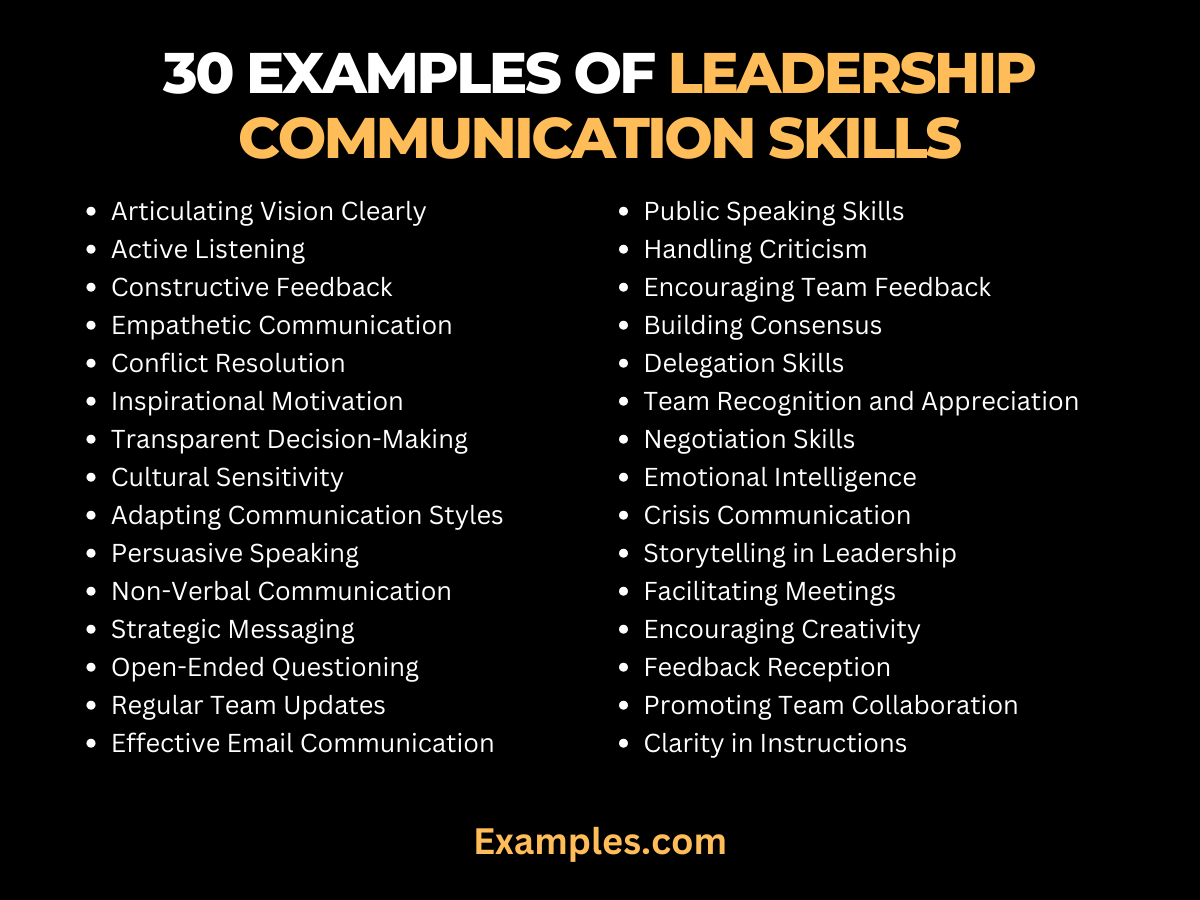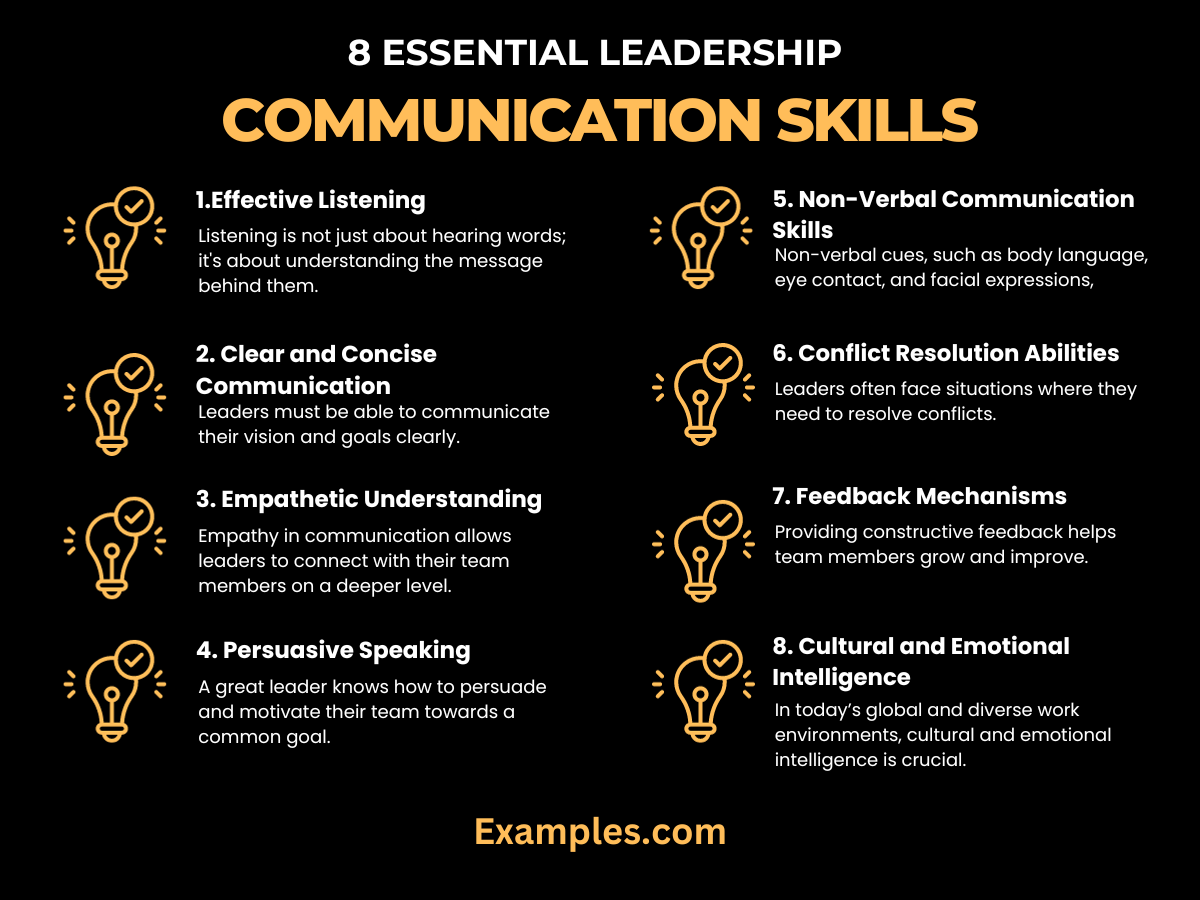29+ Communication Skills of a Leader Examples
Embark on a journey to master the art of leadership through our detailed guide on Communication Skills of a Leader. This resource is packed with valuable insights and communication examples, showcasing how effective dialogue can transform leadership styles. Whether you’re an aspiring leader or looking to refine your skills, this guide provides practical examples and tips to enhance your communication prowess, crucial for leading with clarity, empathy, and vision in today’s dynamic environments.
30 Examples of Leadership Communication Skills
Discover the essence of effective leadership with our compilation of 30 distinct examples of leadership communication skills. This guide not only provides communication skills examples but also illustrates their application in real-life scenarios. Each example is accompanied by a brief explanation, offering insights into how leaders can communicate more effectively in various situations. Enhance your leadership repertoire with these practical, impactful communication techniques that resonate with teams and drive successful outcomes.

- Articulating Vision Clearly: A leader clearly communicates the organization’s vision, ensuring every team member understands and aligns with the goals.
- Active Listening: Shows genuine interest in team members’ ideas, encouraging open communication and a collaborative atmosphere.
- Constructive Feedback: Provides specific, actionable feedback that fosters growth and improvement.
- Empathetic Communication: Demonstrates understanding and empathy, building trust and strong relationships with team members.
- Conflict Resolution: Effectively mediates disputes, ensuring fair and respectful resolutions.
- Inspirational Motivation: Uses motivational speeches and stories to inspire and uplift the team.
- Transparent Decision-Making: Shares the reasoning behind decisions, promoting trust and transparency.
- Cultural Sensitivity: Communicates with respect to diverse cultural backgrounds, ensuring inclusivity.
- Adapting Communication Styles: Tailors communication to suit different team members, enhancing understanding and effectiveness.
- Persuasive Speaking: Uses persuasive techniques to influence and guide the team towards objectives.
- Non-Verbal Communication: Utilizes positive body language to reinforce spoken words and convey approachability.
- Strategic Messaging: Aligns communication with organizational strategies, ensuring clarity in purpose and direction.
- Open-Ended Questioning: Encourages deeper thinking and exploration through thought-provoking questions.
- Regular Team Updates: Keeps the team informed about developments and changes.
- Effective Email Communication: Writes clear, concise emails that convey the necessary information efficiently.
- Public Speaking Skills: Delivers compelling speeches that engage and motivate the audience.
- Handling Criticism: Responds to criticism positively, using it as an opportunity for improvement.
- Encouraging Team Feedback: Actively seeks and values team input, fostering a culture of shared ownership.
- Building Consensus: Strives for collective agreement in team decisions and actions.
- Delegation Skills: Delegates tasks effectively, empowering team members and fostering skill development.
- Team Recognition and Appreciation: Regularly acknowledges team efforts, enhancing morale and motivation.
- Negotiation Skills: Negotiates skillfully to reach beneficial outcomes for all parties involved.
- Emotional Intelligence: Demonstrates high emotional intelligence in understanding and managing emotions.
- Crisis Communication: Communicates calmly and clearly during crises, providing direction and reassurance.
- Storytelling in Leadership: Uses storytelling to make concepts relatable and memorable.
- Facilitating Meetings: Conducts effective and inclusive meetings, ensuring productive discussions.
- Encouraging Creativity: Invites creative solutions and ideas, fostering innovation within the team.
- Feedback Reception: Openly receives feedback from others, showing willingness to grow and adapt.
- Promoting Team Collaboration: Encourages collaborative efforts, enhancing team synergy and output.
- Clarity in Instructions: Gives clear, concise instructions, ensuring tasks are understood and executed effectively.
8 Essential Leadership Communication Skills
In the dynamic landscape of leadership, the prowess of communication plays a pivotal role. The ability to convey ideas, listen to others, and foster an environment of open dialogue is integral to effective leadership. This guide delves into the 8 essential communication skills that every leader should master to lead successfully and inspire their teams.

Effective Listening
Listening is not just about hearing words; it’s about understanding the message behind them. An effective leader listens actively, showing genuine interest and engagement in what others are saying. This skill builds trust and shows team members that their opinions are valued.
Clear and Concise Communication
Leaders must be able to communicate their vision and goals clearly. This involves using straightforward language, avoiding jargon, and ensuring that the message is easily understood by everyone in the team.
Empathetic Understanding
Empathy in communication allows leaders to connect with their team members on a deeper level. Understanding and acknowledging the team’s feelings and perspectives fosters a supportive work environment and strengthens team bonds.
Persuasive Speaking
A great leader knows how to persuade and motivate their team towards a common goal. This skill involves presenting ideas and arguments compellingly, ensuring that the team is aligned and committed to the vision.
Non-Verbal Communication Skills
Non-verbal cues, such as body language, eye contact, and facial expressions, play a significant role in communication. Leaders should be aware of their non-verbal signals and how they impact their message.
Conflict Resolution Abilities
Leaders often face situations where they need to resolve conflicts. Effective conflict resolution involves understanding all sides, mediating discussions fairly, and finding a solution that respects everyone’s perspectives.
Feedback Mechanisms
Providing constructive feedback helps team members grow and improve. Leaders should master the art of giving feedback that is specific, actionable, and focused on behavior rather than personal attributes.
Cultural and Emotional Intelligence
In today’s global and diverse work environments, cultural and emotional intelligence is crucial. Leaders should be able to communicate across various cultural contexts and manage their own and others’ emotions effectively.
Tips for Effective Communication in Leadership
Effective communication is a cornerstone of successful leadership. This guide outlines 10 practical tips for leaders to enhance their communication skills in leadership, focusing on clarity, empathy, and engagement. These tips are not just techniques but pathways to creating stronger connections, building trust, and driving team success. Understanding and implementing these communication strategies can significantly elevate a leader’s ability to guide and inspire their team.
- Active Listening: Show genuine interest in team members’ ideas by listening actively and attentively.
- Consistent Messaging: Maintain consistency in your communication to avoid confusion and ensure everyone is on the same page.
- Use of Non-Verbal Cues: Employ effective body language and facial expressions to reinforce your spoken words.
- Empathy in Responses: Respond to team members with understanding and empathy, fostering a supportive atmosphere.
- Clarity in Directions: Be clear and concise in your instructions to avoid misunderstandings and mistakes.
- Open-Door Policy: Encourage open communication by being approachable and available for discussions.
- Regular Team Updates: Keep the team informed about progress, changes, and expectations.
- Feedback Culture: Promote a culture where giving and receiving feedback is a regular practice.
- Encourage Questioning: Create an environment where team members feel comfortable asking questions.
- Cultural Sensitivity: Be mindful of cultural differences in communication styles within your team.
Why are Leadership Communication Skills Important?
Leadership communication skills are fundamental to the success of any leader, playing a pivotal role in shaping organizational culture, driving team performance, and achieving goals. These skills are vital for several reasons, each underscoring the value of effective communication in a leadership role.
Building Trust and Credibility: Effective communication helps leaders establish trust and credibility. When leaders communicate transparently and consistently, they foster a sense of reliability and integrity.
Facilitating Team Cohesion: Good communication skills are crucial for creating a cohesive team environment. Leaders who communicate effectively can align team members with common goals, enhance collaboration, and minimize misunderstandings.
Boosting Team Morale and Engagement: Leaders with strong communication skills can motivate and inspire their team. Recognizing achievements, providing constructive feedback, and conveying a clear vision enhances team morale and engagement.
Enhancing Decision-Making and Problem-Solving: Effective communication enables leaders to gather diverse perspectives and insights, leading to more informed decision-making and innovative problem-solving.
Managing Change Effectively: In times of change, strong communication skills are key. Leaders must articulate the vision and the rationale behind changes to ensure team alignment and adaptation.
Resolving Conflicts: Communication plays a critical role in conflict resolution. Leaders need to mediate disputes and communicate resolutions effectively to maintain harmony within the team.
In summary, leadership communication skills are essential as they directly impact the leader’s ability to guide, influence, and connect with others, ultimately determining the effectiveness and success of their leadership.
What are the Six Leadership Communication Skills?
The six leadership communication skills are fundamental competencies that every leader should possess to lead effectively. These skills encompass a range of abilities that facilitate successful interactions and management within a team or organization.
1. Active Listening: This skill involves fully concentrating, understanding, responding, and remembering what is being said. Active listening ensures leaders understand their team’s needs and concerns.
2. Articulate Speaking: Leaders must be able to convey their thoughts, ideas, and instructions clearly and concisely. This includes public speaking and everyday conversations.
3. Non-Verbal Communication: Body language, facial expressions, and gestures can often speak louder than words. Leaders need to be aware of their non-verbal cues and interpret others’ non-verbal communication effectively.
4. Emotional Intelligence: This involves understanding and managing one’s own emotions and empathizing with others. Emotional intelligence is key to building strong relationships and handling sensitive situations.
5. Persuasion and Influence: These skills enable leaders to inspire, motivate, and positively influence their teams towards achieving goals and embracing changes.
6. Feedback Delivery: Providing constructive, actionable feedback is crucial for team development and growth. Leaders should be adept at giving and receiving feedback.
In conclusion, the Communication Skills of a Leader are not just tools for effective management; they are the cornerstone of inspiring and maintaining a successful team. As outlined in the article, the power of communication in leadership is multifaceted, impacting everything from building trust to guiding teams through change. By harnessing these skills, leaders can create an environment where transparency, empathy, and collaborative problem-solving thrive.
For further reading on the importance of communication in leadership, the University of Pennsylvania’s online platform offers insightful perspectives on why effective communication is essential for leadership success. Their article, “Why communication is essential to effective leadership”, delves into how strong communication skills empower leaders to articulate their visions, build trust, and encourage collaboration towards common goals.
Additionally, Harvard Business School Online provides a deeper exploration of these skills in their piece on “8 Essential Leadership Communication Skills”. This resource is invaluable for leaders looking to enhance their communication capabilities, offering practical advice on skills such as adapting communication styles, active listening, transparency, and empathy, among others.



